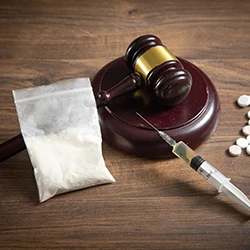Possessing illegal drugs can have serious consequences that may affect a person's personal and professional life and even lead to jail time if they have prior federal drug convictions or hold a large amount of the substance.
As an experienced federal law attorney, I aim to help you understand drug possession charges and their possible consequences.
This article will provide you with everything you need to know on the topic.
Quick Summary
- The number of years in jail for drug possession charges varies based on the type and amount of the controlled substance involved and any prior criminal history.
- The severity of drug possession charges can vary from a Class C misdemeanor to an Enhanced Felony 1.
- Different kinds of drugs are prosecuted in different ways, with the severity of drug charges based on the drug's schedule, which is determined by its potential for abuse and lack of medical benefits.
How Many Years In Jail For Drug Possession?

The number of years in jail for drug possession charges varies depending on various factors, such as the type and amount of the illegal drugs involved and any prior federal drug convictions.
Actual possession of illegal drugs can be both a state and federal crime. Sometimes it can lead to being charged with a misdemeanor, which may result in up to one year of imprisonment as a penalty.
According to Texas PC, drug possession charges can range from a Class C misdemeanor to a 1st-degree felony, depending on the type of charge and the drug's schedule [1].
The associated fines and jail sentences for each classification are as follows:
- Class C Misdemeanor: Up to $500 fine, community service
- Class B Misdemeanor: Up to $2,000 fine, up to 180 days in jail
- Class A Misdemeanor: Up to $4,000 fine, up to 1 year in county jail
- State Jail Felony: Up to $10,000 fine, 6 months to 2 years in state jail
- 3rd Degree Felony: Up to $10,000 fine, 2 to 10 years in prison
- 2nd Degree Felony: Up to $10,000 fine, 2 to 20 years in prison
- 1st Degree Felony: Up to $50,000 fine, 5 to 99 years in prison
- Enhanced Felony 1: Up to $100,000 fine, 10 to 99 years in prison
Being convicted of a federal drug crime can lead to lasting consequences, such as being unable to possess a firearm and being denied federal benefits like student loans and scholarships.
Second and subsequent convictions could face a penalty of up to $15,000 and between 2 to 5 years in prison.
While mandatory minimum sentences are usually associated with drug trafficking and manufacturing charges, most drug possession charges may result in a night or two in jail.
Related Article: Convicted of a Misdemeanor
Types Of Drug Possession Charges
In general, how many years you'll face in jail for drug possession charges is based on the specific drug possession charge and the type of drug allegedly possessed.
The severity of the charge is largely based on the amount of drugs involved, whether it involves prescription drugs or illegal drugs.
Some common drug-related crimes are:
- Constructive possession of drug paraphernalia
- Possession of a controlled substance
- Distribution of a controlled substance
- Possession to manufacture a controlled substance
How Are Different Types Of Drugs Prosecuted?
Different types of drugs are prosecuted in different ways based on the type of drug and the state in which it is being prosecuted. These factors will determine the severity of the drug charge and the potential sentence for a drug possession charge.
For example, marijuana possession typically results in misdemeanor charges in most states, while other drugs, such as heroin or cocaine, may be charged as felonies.
In addition, many states have implemented specific drug laws that establish different penalties for possessing certain drugs.
The severity of drug possession charges depends on the drug's assigned schedule, which is determined by the potential for abuse and lack of medical benefits.
High-schedule drugs are prosecuted more severely than low-schedule drugs.
1. Schedule I Drugs
According to the agency, schedule 1 drugs are substances categorized by the United States Drug Enforcement Administration (DEA) as having a high risk for drug abuse and with no currently accepted medical use [2].
The United States government regulates drugs and chemicals under the Controlled Substances Act (CSA), and these regulated substances are referred to as controlled substances. [3]. These drugs are considered the most dangerous and are tightly controlled.
These drugs include:
- Heroin
- LSD
- Mushrooms
- Marijuana
- Ecstasy
- Fentanyl
If you are in a state where marijuana possession has been legalized for personal and medical use, having a small amount of marijuana or cannabis concentrate will probably not result in criminal drug possession charges.
However, in most states, possessing small amounts of other controlled substances can lead to criminal charges, even misdemeanors.
2. Schedule II Drugs
Schedule II drugs are substances categorized by the DEA as having a high potential for abuse and dependence.
These drugs are medically approved but have a high potential for addiction and abuse. Therefore, their possession and distribution are strictly regulated by federal laws.
These drugs include:
- Cocaine
- Methadone
- Morphine
- Oxycontin
- Percocet
- Methamphetamine
3. Schedule III Drugs
Schedule III drugs are substances categorized by the DEA as having a moderate to low potential for physical and psychological dependence.
These drug examples include:
- Anabolic steroids
- Ketamine
- Combination products containing less than 90 milligrams of codeine per unit of dosage.
4. Schedule IV Drugs
Schedule IV drugs are substances categorized by the DEA as having a low to moderate potential for abuse and dependence.
Possessing or distributing Schedule IV drugs without a valid prescription is a criminal offense, even though they have a lower potential for abuse when compared to other controlled substances.
Some of the drugs include:
- Xanax
- Valium
You have certain protections under the law. Suppose you believe that law enforcement, without a warrant or probable cause, searched you or your property. In that case, you may be able to factor this element into your case
- Jay Blass Cohen, Criminal Defense Attorney at Blass Law
Ways To Prepare Yourself For Your Legal Battle
You can follow a few steps while working with a legal professional to improve your chances of a favorable outcome in your simple drug possession case.
These steps include:
- Discontinuing any drug or alcohol use
- Refraining from discussing your issue on social media
- Avoiding sharing any information with state representatives and direct them to your legal team
- Not leaving the state even for recreational purposes
- Distancing yourself from anyone involved in the charges.
While these measures do not guarantee a reduced sentence or fines, they may prevent additional penalties.
FAQs
Do Drug Possession Penalties Differentiate Based On The Type Of Drug You Possessed?
Yes, drug possession penalties differentiate based on the type of drug you possess. The DEA categorizes drugs into schedules based on their potential for abuse and accepted medical use in the United States.
Does The Quantity Of The Drug Possessed Make A Difference?
Yes, the quantity of the drug possessed makes a difference in drug possession penalties. In many cases, possessing larger amounts of drugs can result in more severe penalties, indicating an intent to distribute or sell.
What Happens If You Have A Criminal Record?
If you have a criminal record, it can impact drug possession penalties and the severity of the sentence. A previous federal drug conviction often has harsher consequences, such as lengthier imprisonment and increased fines.
Related Article: How Long Does a Felony Stay On Your Record?
If you feel affected by any of these matters, contact our criminal defense attorney today.
Contact A Criminal Defense Attorney Today
If you're facing drug possession charges, having an experienced criminal defense attorney by your side is important to protect your rights and fight for your future.
Our team of skilled lawyers at Schmidt & Clark, LLP has the expertise to assist you through the legal proceedings. Contact us today to secure a positive result.
References:
- https://statutes.capitol.texas.gov/Docs/PE/htm/PE.12.htm
- https://www.dea.gov/drug-information/drug-scheduling
- https://www.dea.gov/drug-information/csa

 Published by
Published by 



